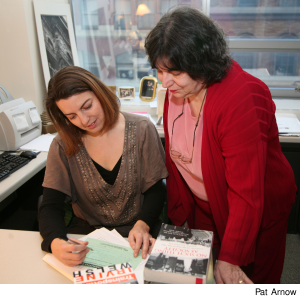It was a meeting like no other in PSC history. Hundreds of people took part – from hundreds of different locations.
Edwin Diaz, an academic advisor at Hostos, joined in from his home after putting his two small children to bed.
Alan Feigenberg, a professor of architecture at City College, listened to the mass conference call while relaxing barefoot in his living room, listening to jazz.
Edgardo Diaz, an adjunct at John Jay, tuned into the one-hour virtual meeting via his Blackberry while he ran errands on the Upper West Side.
All three are members of the PSC’s Committee of 500, rank-and-file activists who have volunteered to take some simple steps to help win a good contract in negotiations that begin this Spring. The November 30 conference call was an opportunity for the Committee of 500 to learn more about the bargaining agenda just approved by the PSC Delegate Assembly, and discuss how the union can succeed in the face of an adverse political climate.
CALL-IN QUESTIONS
The call began on a Tuesday evening at 7:30, with an introduction from PSC President Barbara Bowen. Then the union bargaining team took call-in questions from members, who lined up in a queue managed by the phone system’s operator. “It was like talk radio,” said one participant, “but more thoughtful.”
Bowen began with a short review of the PSC’s four core contract demands: continuing to make CUNY salaries nationally competitive; restructuring full-time faculty workload; making significant gains on pay parity and job stability for adjuncts; and establishing a path for advancement for those in Higher Education Officer titles (HEOs).
The PSC contract agenda contains 35 demands, and a number of questions were raised about specific points. For example, Pedro Luna, an Associate HEO at Lehman, asked whether the union would support tuition waivers for the children of HEOs as well as faculty. PSC negotiators answered that both faculty and professional staff are definitely included in the union’s demand.
At the end of November, President Obama announced that he was freezing the wages of federal workers for two years (see page 10). Beth Rosenthal, professor of social work at York College and the Graduate Center, asked if New York State could automatically freeze the wages of public employees in the same manner. Bowen noted that the PSC and other unions had defeated Gov. Paterson’s attempt to impose furloughs in court. Future pay increases, she said, depended on a strong contract campaign.
ORGANIZING DISCUSSION
In the organizing discussion, John Hyland of the Retirees Chapter asked how a variety of protest tactics including civil disobedience could be used to build a mass movement demanding more resources for CUNY and opposing the broader attacks on the public sector. “People have to be able to say ‘No!’ to those things that are not good for us,” Hyland told Clarion. “We need to add this more defiant approach to our toolbox.”
Lenny Dick, an adjunct in mathematics at BCC, reported that faculty and students rallied on their campus on October 19 to mark the expiration of the contract, and again in November over looming budget cuts. This kind of local mobilization, said Dick, can provide building blocks for “a cross-campus movement.”
At the end of the call, Bowen asked each participant to strengthen the contract campaign by signing up at least one colleague to join the Committee of 500. PSC members who join the Committee commit to take six simple actions, such as attending a contract bargaining session as an observer or encouraging colleagues to attend a future union protest.
 |
Jackie DiSalvo, an associate professor of English at Baruch, signed up three new members at her department’s holiday party the following week. “I just said, ‘We’ve established a Committee of 500 so we can have a broad group of people supporting the contract campaign,’” DiSalvo told Clarion. “It’s a way of participating that doesn’t put too much of a burden on any one person.”
One of those whom DiSalvo recruited to the committee was Mary McGlynn, an associate professor in the same department. McGlynn said today’s harsh political and economic climate, together with DiSalvo’s impending retirement after 26 years, helped convince her to join. “It seems like it’s time for the rest of us to start participating,” McGlynn told Clarion.
MOVING FORWARD
Those who took part in the conference call often said the union should organize more such calls in the future. “It was a very interesting discussion, one with a lot of substance,” said Jerry Markowitz, a distinguished professor of history at John Jay. “There was a diversity of viewpoints that I thought brought a real strength to the discussion, and a variety of voices that kept me engaged. Everyone was wonderfully articulate!”
“After the call, I felt like I could talk about the union’s four main demands more clearly,” added Suzan Moss, chair of the Health and Wellness Department at BCC. Moss plans to pass out sign-up cards to the 31 members of her department at their first meeting of the new semester. “It’s a ‘put your money where your mouth is’ kind of situation,” Moss said. “You can’t complain about the contract if you don’t get involved.”
___________________________________________________________________________
Join the Committee of 500, or find out more about it, on the PSC website.

